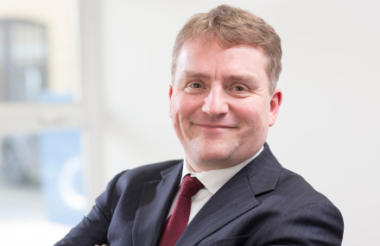The result of the EU Referendum shows that the sector risks being seen as part of the “London Metropolitan elite” by those it is supposed to represent, the Institute of Fundraising Convention was warned yesterday.
Karl Wilding, director of public policy and volunteering at NCVO (pictured), was speaking at a session on the implications of the UK leaving the European Union at the Institute of Fundraising Convention in London yesterday.
He said that that the result of the EU referendum should make the charity sector as a whole question whether or not it is in touch with the communities and people that it claims to represent.
“I think the real problem that we have as the voluntary sector is that we didn’t see this coming. It feels like a re-run of the 2015 election result, where everyone I worked with was shocked that the Labour Party didn’t win.
“How can that be? We’re meant to be representing the communities that felt most remote from government, that felt most disaffected and that they weren’t being listened to.
“I think a question this sends our way is: do we actually reflect the communities that we serve and that we work with? Or are we actually that metropolitan, London elite that people have just revolted against?”
Wilding said that the result of the referendum felt “like a serious echo of the sorts of things that have been happening over the last year” and said that the sector needs to listen to its donors and beneficiaries more in the future.
Financial uncertainty
Caron Bradshaw, chief executive of the Charity Finance Group, said that the financial uncertainty caused by the Brexit vote would wreak the most havoc on the charity sector, in both the short and long term.
Bradshaw was also speaking at the IoF yesterday.
"Uncertainty is the killer," she said. "It’s the thing that strips you of your ability to plan effectively, because you’re constantly having to scenario-plan for a whole host of things that may or may not happen."
Bradshaw also warned of the high possibility of the country slipping into another recession.
Despite the dire predictions, Bradshaw said that the charity sector had already come through one of the “longest and darkest recessions since the Great Depression. Yes we lost some damn good charities along the way, but we can survive this.”
We need to do some listening
Elsewhere at the All Party Parliamentary Group on Charities and Volunteering sector leaders said the EU referendum result showed that the sector needs to make sure it is listening to beneficiaries.
Mark Simms, chief executive of P3 which provides a range of services to disadvantaged people, said: “I watched the result with increasing incredulity as areas that voted to leave by some margin were areas that we deliver services in.
“We have had to go back and think to ourselves – are we as organisations listening? Are people being heard? That is quite a challenge.”
He added that his organisation had had discussions with service users following the result and found that, even in areas where people were benefiting from EU funds, they weren’t seeing it. “It is about personal stories,” he explained.
“The issue for charities is to get into that narrative,” he said. “People feel they have been let down by everybody.”
Simms said charities now have “an opportunity to connect with people” who are “more visible now – and they have got a voice”.
Kathy Evans, chief executive of Children England, said that the consequences of Brexit could have big consequences for charities with large pension deficits and that “we are back in some really unstable territory”.
Additional reporting by Kirsty Weakley
Editor's note: This article originally stated that Caron Bradshaw was speaking at the APPG. She was at the IoF Convention.








